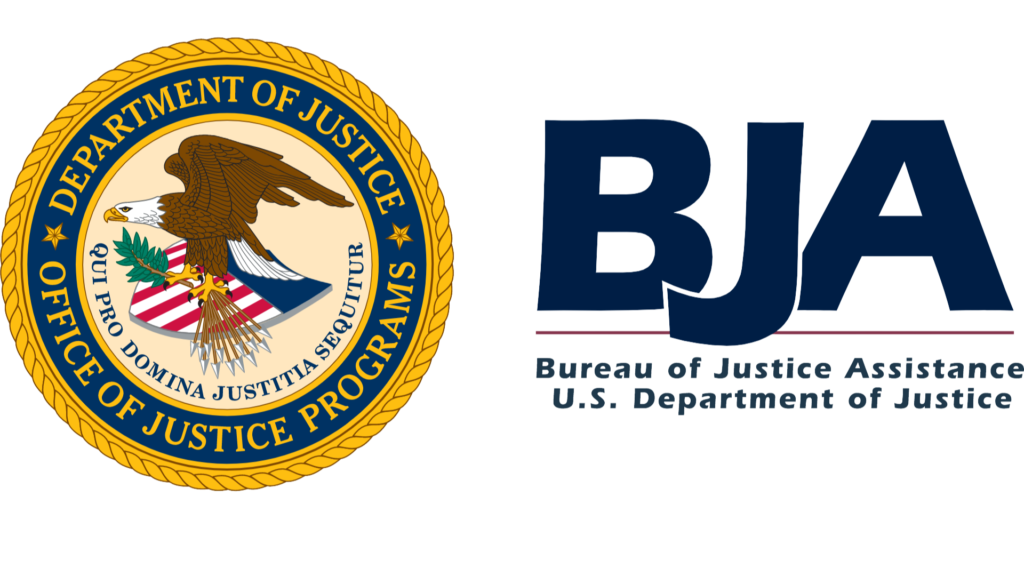Georgia: Monitoring Data Trends after 2017 Justice Reinvestment Initiative Reforms
After several months of analysis and policy development, in 2017 Georgia Governor Nathan Deal signed Act 226, which codified the Justice Reinvestment policy framework developed by the Georgia Council on Criminal Justice Reform. It included policies to reduce lengthy probation terms and large probation caseloads, improve the cost-effectiveness of responses to probation and parole violations, and improve handling of legal financial obligations for people on felony probation. Since then, Georgia has achieved many of its reform goals and has implemented processes to track relevant data to monitor the use of new policies. Photo credit: esfera via Shutterstock.
Background
Since 2012, Georgia has been engaged in reforms to address various challenges in the state’s criminal justice system. In 2016, the state focused on community supervision, as Georgia had the highest rate of adults on probation in the country. After several months of analysis and policy development as part of the state’s work through the Justice Reinvestment Initiative, which is funded by the U.S. Department of Justice’s Office of Justice Programs, Bureau of Justice Assistance and The Pew Charitable Trusts, in 2017 Governor Nathan Deal signed Act 226, which codified the Justice Reinvestment Initiative policy framework developed by the Georgia Council on Criminal Justice Reform. It included policies to reduce lengthy probation terms and large probation caseloads, improve the cost-effectiveness of responses to probation and parole violations, and improve handling of legal financial obligations for people on felony probation.
Major Policy Areas or Reforms:
- Prioritize supervision resources during the first two to three years of a person’s probation term.
- People who are sentenced to probation for first-time felony offenses receive a behavioral incentive date (BID) that encourages compliance with the terms of their supervision. If a person remains in compliance with those terms, has no new arrests, has paid all restitution, and a judge grants release at the BID, his or her probation is reduced from an average of five years to no more than three years.
- Require the Department of Community Supervision (DCS) to file a petition for early termination of probation sentences after three years on supervision if the person is sentenced to certain non-violent property or drug offenses, all probation conditions are met, the person has no new arrests, and restitution is paid in full.
- Permit DCS to move certain people on felony probation who are at a low risk of reoffending to unsupervised status after two years, provided that restitution obligations have been paid in full and they have maintained good conduct.
Visit our website for additional information: www.csgjusticecenter.org.
Impacts of Legislation
Georgia has achieved many of its reform goals and has implemented processes to track relevant data to monitor the use of new policies. The active felony probation population has decreased and DCS has approved approximately 34 percent of requests for moving a person on probation to unsupervised status. DCS has seen a 33 percent reduction in average caseload sizes since the enactment of the state’s Justice Reinvestment legislation, from 138 to 93. Additionally, the BID policy is being used more broadly each year.
Georgia should continue to monitor usage of the BID policy by judicial circuit and consider outreach to circuits with low utilization and circuits in which probation sentences are rarely terminated at the BID. Georgia should also monitor data on early termination to understand how the policy is being used and whether there are opportunities to improve its use.
Public Safety Impacts
The reduction in the active felony probation population resulting from Georgia’s Justice Reinvestment policies has allowed officers to focus time and resources on people at the highest risk to recidivate. This impact is most clearly seen in the significant drop in the average caseload size. With fewer people on their caseloads, officers are better able to prioritize those that present a risk to public safety and their communities. Directing time and appropriate resources to these high-risk individuals can help them succeed on probation and lower their risk of recidivism. The BID policy also provides probationers with an incentive for compliance with their supervision conditions and encourages positive behavior change to earn early discharge.
The prison population decreased in FY2020, as did the actively supervised probation population.
Prison Population: Actual and Projected, 2010–2022
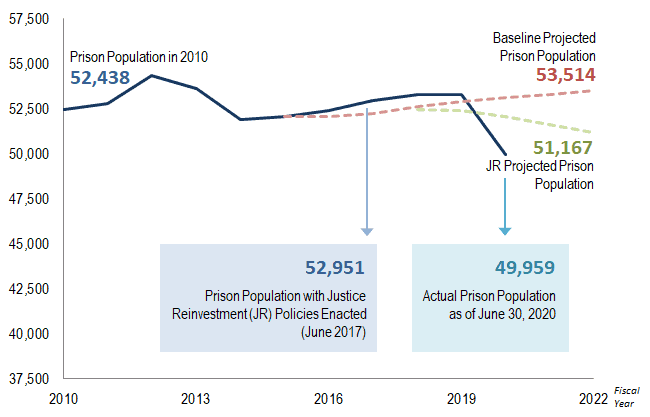
Actively Supervised Probation Population, April 2016 vs. June 2020
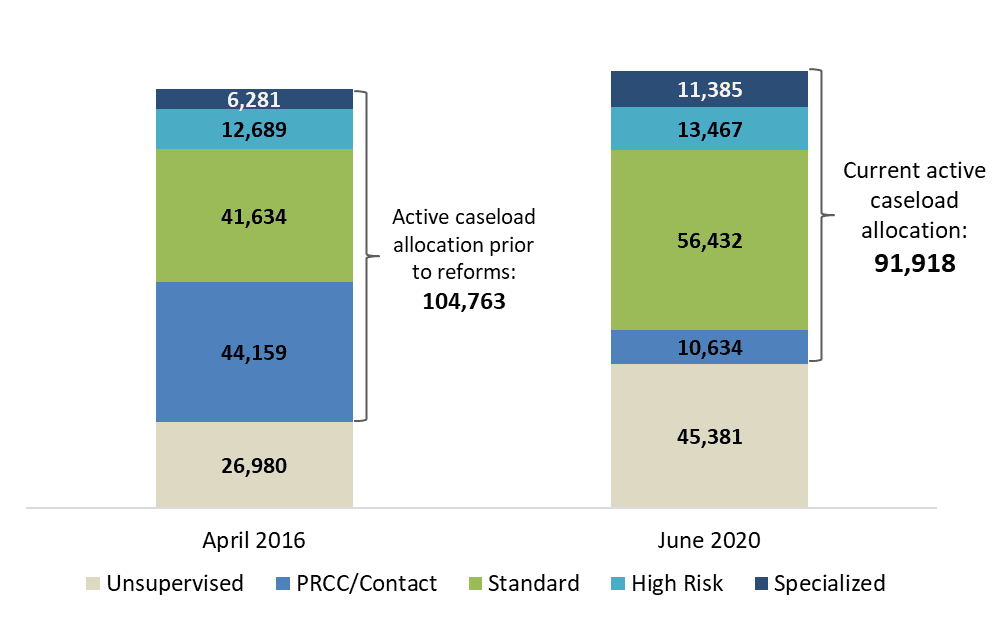
Selected Policy and Reform Outcomes
The BID policy is being used more broadly each year. The percentages in the chart below indicate the proportion of new probation sentences with a BID out of all eligible probation sentences.
Behavioral Incentive Date (BID), FY2018–FY2020
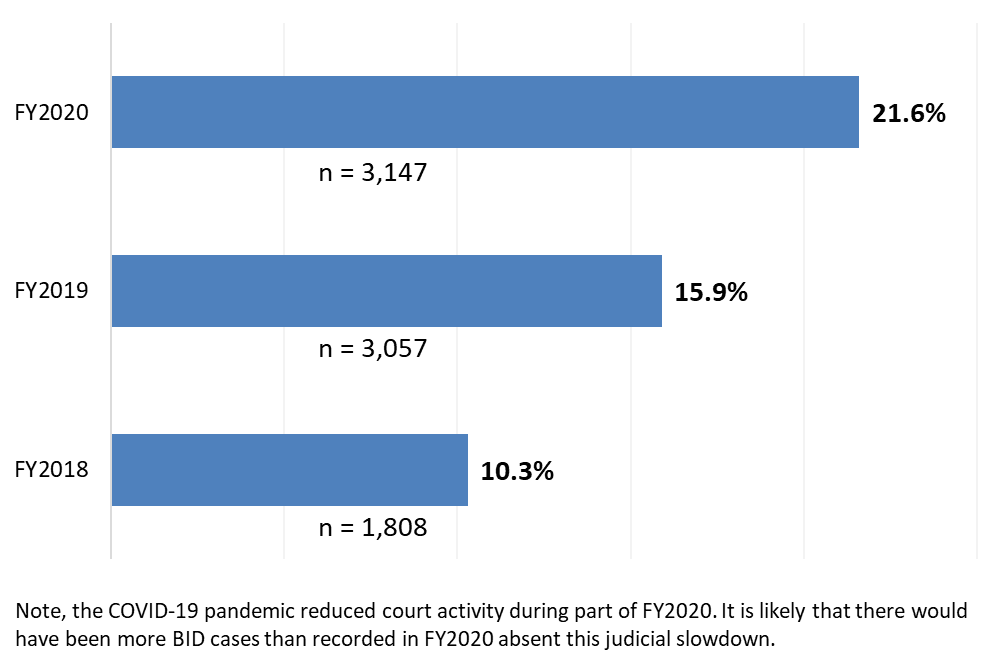
Statewide, use of the BID sentencing option occurred in approximately 15.6 percent of all eligible probation cases over the past three fiscal years; however, usage varies widely by judicial circuit.
Percent of BID Sentences out of Eligible Probation Cases: Top 20 Judicial Circuits’ Use of BID Sentencing, FY2018–FY2020
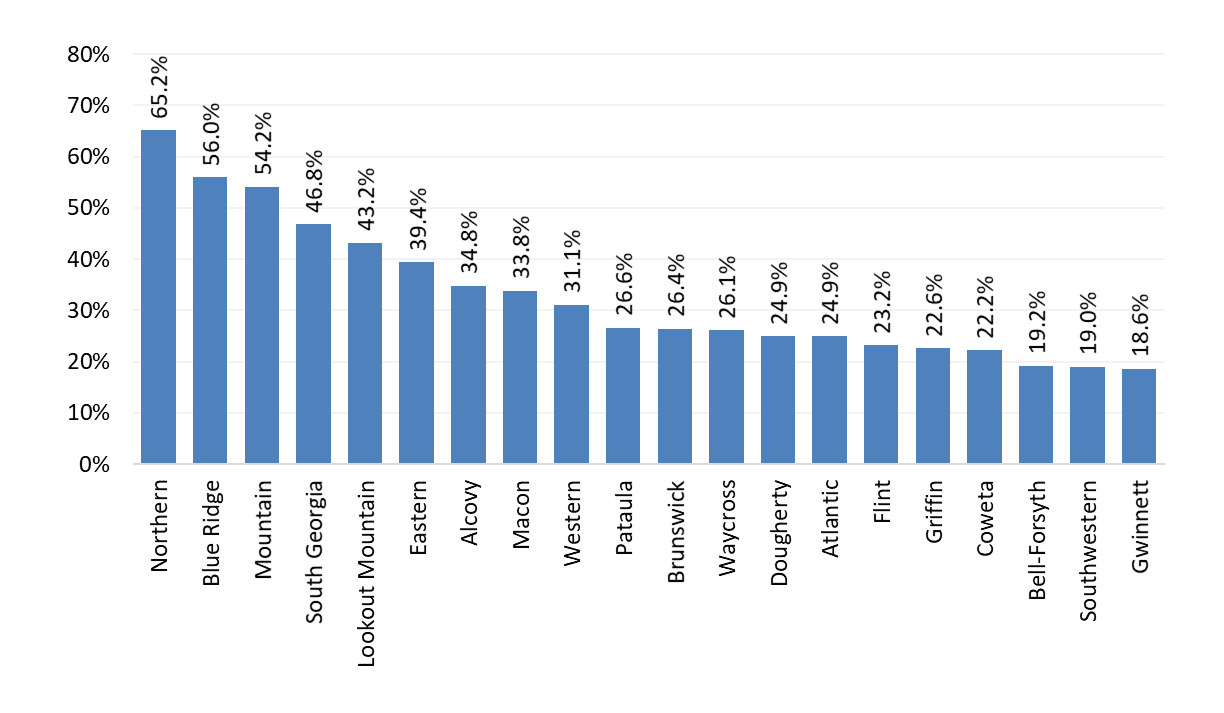
An automated scheduler notifies DCS supervising officers when a case is eligible for early termination (three years after the start date). The system reviews the case to check for arrests, revocations, or other indications of noncompliance, and if none are found, the case is forwarded to a supervising officer for additional review. Of all cases reviewed by DCS, approximately 15 percent meet eligibility requirements and are forwarded to courts for judicial review.
Early Probation Terminations, July 2017–June 2020
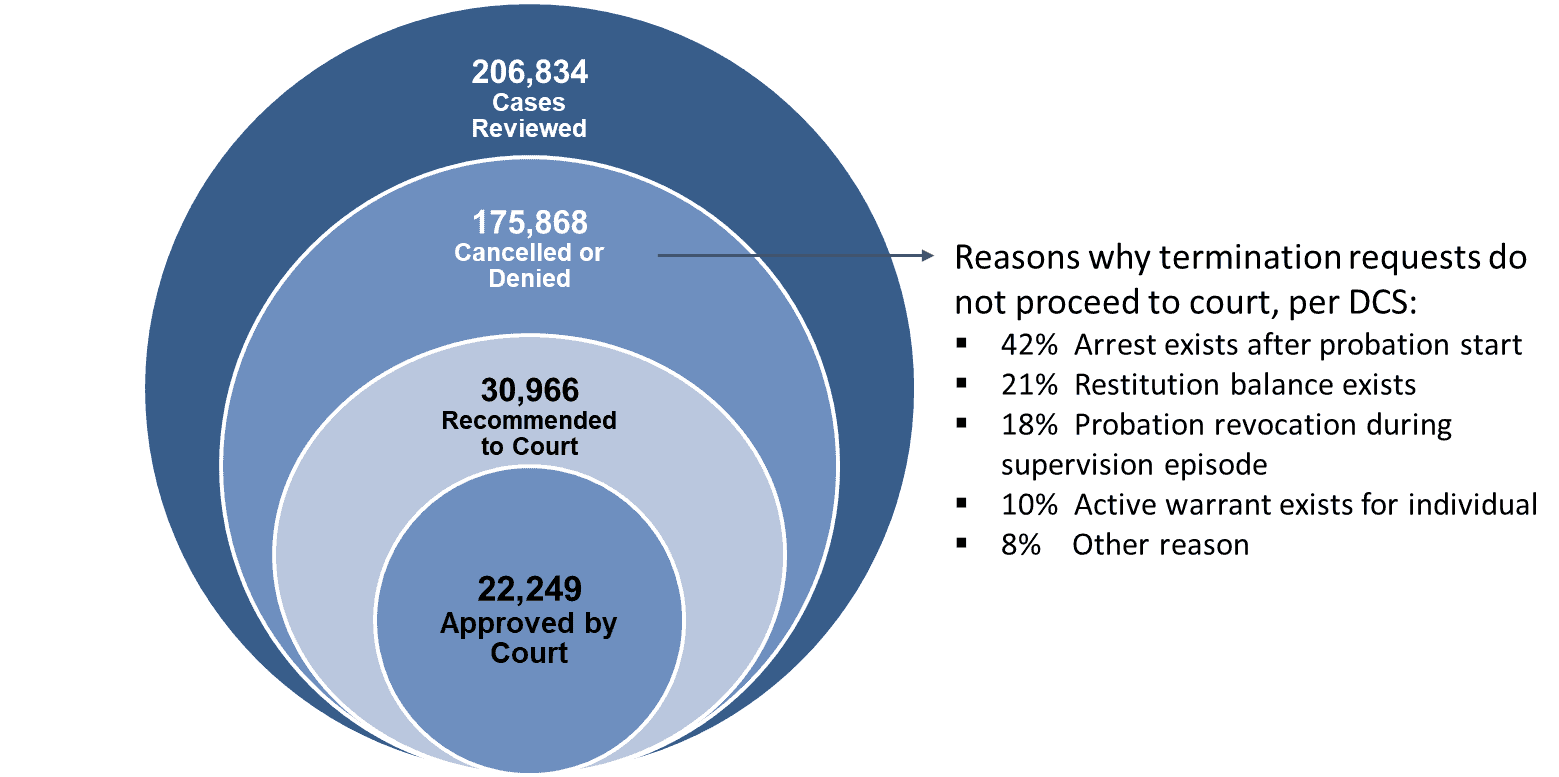
DCS has approved approximately 34 percent of requests for moving a person on probation to unsupervised status, thereby reducing the active caseload and allowing supervising officers to focus on higher risk cases.
Unsupervised Status on Probation, June 2020
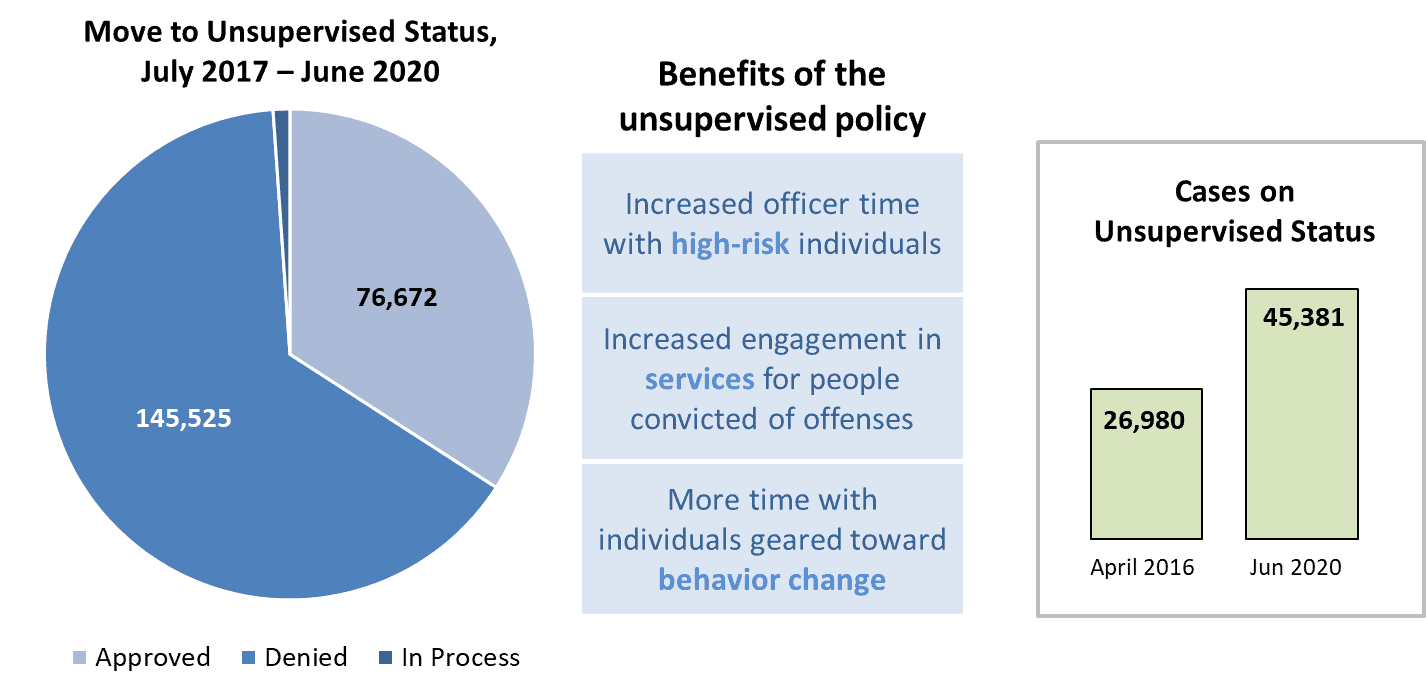
Additional Accomplishments Related to Reforms
- DCS adopted a new risk instrument for classifying individuals rolling onto probation caseloads. The new tool incorporates any time that an individual spent in Georgia Department of Corrections’ custody prior to placement on probation in determining their risk level.
- As part of the state’s Justice Reinvestment technical assistance, The CSG Justice Center analyzed outcomes for individuals who had been treated at a Residential Substance Abuse Treatment facility to determine whether recidivism rates were higher for individuals receiving six months of treatment compared with individuals receiving nine months of treatment.
- With subaward funding through Justice Reinvestment, DCS contracted with the University of Georgia to modify, pilot, and validate an existing program assessment tool to use for evaluating outcomes of the state’s Day Reporting Centers. Additionally, the state is developing a data dashboard to display key criminal justice performance indicators of interest to legislators, stakeholders, and the general public.
Reinvestments

Sources for this Report
Figure 1: Actual population figures are pulled from the Georgia Department of Corrections, “Friday Report”; ARS provided the baseline prison population projection through FY2020 “OPC_2015_Updated_to2016_Projection”, which CSG Justice Center extrapolated to FY2022
Figure 2: Georgia Department of Community Supervision monthly data monitoring report, “SB174ProbationTerminationRequests_2020jul15.xlsx”
Figures 3 and 4: Department of Community Supervision “SB174 Monthly Report spreadsheet.pdf”
Figure 5: CSG Justice Center analysis of Active Probationers file, April 2016; DCS reports “supervisionStatusBreakdownReport.pdf” and “DCS Fact Sheet (SB174).pdf”, July 2020
Figure 6: CSG Justice Center analysis of Active Probationers file, April 2016, DCS data monitoring spreadsheets: “supervisionStatusBreakdownReport.pdf” and “SB174UnSupervisedRequests_2020jul15.xlsx”
Project credits
Writing: Angela Gunter, Alison Martin, CSG Justice Center
Research: Angela Gunter, CSG Justice Center
Advising: Elizabeth Lyon, CSG Justice Center
Editing: Leslie Griffin, CSG Justice Center
Public Affairs: Brenna Callahan, CSG Justice Center
Web Development: eleventy marketing group
This project was supported by Grant No. 2019-ZB-BX-K002 awarded by the Bureau of Justice Assistance. The Bureau of Justice Assistance is a component of the Department of Justice’s Office of Justice Programs, which also includes the Bureau of Justice Statistics, the National Institute of Justice, the Office of Juvenile Justice and Delinquency Prevention, the Office for Victims of Crime, and the SMART Office. Points of view or opinions in this document are those of the author and do not necessarily represent the official position or policies of the U.S. Department of Justice.
About the Authors


Almost half of all violent crime in Kentucky is rooted in domestic violence (DV), and nearly 40 percent…
Read More Key Findings and Recommendations from Kentucky’s Justice Reinvestment Initiative to Better Understand and Address Domestic Violence
Key Findings and Recommendations from Kentucky’s Justice Reinvestment Initiative to Better Understand and Address Domestic Violence
Almost half of all violent crime in Kentucky is rooted in domestic…
Read More










